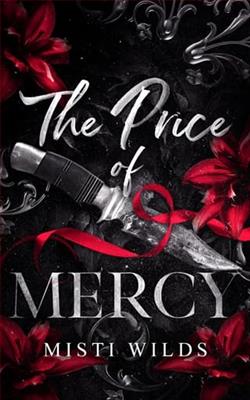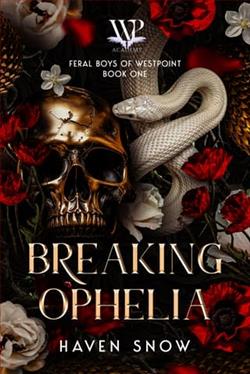Page 8 of Curse in the Quarter
“Private investigator.” He reached for his license, grateful for the excuse to break eye contact. “Bastien Durand. I specialize in cases that require historical context.”
She studied his credentials with the thoroughness of someone who’d learned to spot frauds and time-wasters. As she read, he found himself cataloging the tiny details that marked her as both familiar and strange—the way she chewed her lower lip when thinking, a habit Delia had shared, but also the confident posture and direct gaze that spoke of a woman who’d never needed anyone’s protection.
“Durand,” she repeated, handing back his license. “French Creole family? I think I’ve seen that name in some of our older records.”
Ice shot through his veins. His family name wasscattered throughout Louisiana’s historical documents, but the dates would make no sense if anyone bothered to investigate. Bastien Durand had appeared in New Orleans parish records in 1847, with no prior history. The name had surfaced again in 1923, looking the same age. And again in 1978.
“Probably a coincidence,” he said quickly. “Common name.”
“Maybe.” But her tone suggested she’d filed the detail away. “I’m Delphine Leclair, senior archivist. What specific time period are you interested in?”
“1906. The Saenger Theatre fire and surrounding incidents.”
Something flickered across her expression—not recognition, but the look of someone who’d heard this request before and found it problematic.
“That’s an interesting area of research,” she said. “Most of the official records from that incident were lost over the years, and what survived is incomplete and often contradictory.”
“I’m looking for patterns that might be repeating themselves. Supernatural manifestations, unexplained phenomena, anything that might connect historical events to current incidents.”
She was quiet for a long moment, studying his face with an intensity that made the locket pulse against his ribs. Finally, she nodded toward the research tables.
“I can show you what we have, but you should know that most serious researchers find the 1906 materials . . .frustrating. Too many gaps, too many witness accounts that don’t align with physical evidence.”
As they walked toward the Archive’s main collection,she began to hum—softly, unconsciously, the kind of melody that accompanies routine tasks.
Bastien’s steps faltered.
The tune was identical to the one Delia had hummed outside her boarding house on the last night of her life. Every note, every gentle rise and fall, the same melody that had haunted him for 119 years flowing from Delphine’s lips as naturally as breathing.
His vision blurred. The Archive floor seemed to tilt beneath his feet.
The boarding house parlor in late 1905, where Delia sat at the upright piano picking out melodies by ear. Afternoon light streamed through lace curtains, catching dust motes that danced like spirits around her dark hair. She wore simple blue cotton, sleeves rolled up for comfort, completely absorbed in finding the right combination of notes.
“That's beautiful,” Bastien said from the doorway, though he'd been listening for several minutes without announcing himself.
She looked over her shoulder with a smile that could have powered the Quarter's gas lamps. “It's not a real song. Just something that comes to me when I'm thinking.” Her fingers returned to the keys, picking out the same haunting melody she hummed while working. “Strange, isn't it? How music can feel familiar even when you've never heard it before?”
“Perhaps some songs exist before we discover them.”
“Like they're waiting for the right person to find them?” She patted the bench beside her. “Sit with me. This song is too beautiful to play alone.”
The warmth of her shoulder against his, the unconscious melody rising from her throat between phrases, creating asoundtrack for perfect contentment—moments when the future felt infinite and love felt stronger than death itself.
“Sorry,” Delphine said, catching herself mid-phrase. “Bad habit. I tend to hum when I’m thinking.”
“That melody,” he managed, his voice rougher than intended. “Where did you learn it?”
She looked puzzled. “I don’t know. I’ve always known it, I suppose. My grandmother used to say I hummed it even as a baby.” Her expression grew thoughtful. “It’s strange, actually. I can’t remember anyone teaching it to me, but it feels . . . familiar. Like something I’ve always carried.”
The soul remnant. The piece of Charlotte’s and then Delia’s essence that had survived death and reincarnation, carrying fragments of memory across lifetimes. She didn’t consciously remember their connection, but some part of her recognized the melody that had bound them together.
“Here we are,” Delphine said, stopping beside a section marked “Early 20th Century; Local Incidents.” She pulled several boxes from the shelves with practiced efficiency. “Everything we have on the 1906 fire and related events. Fair warning—it gets strange quickly.”
They settled at adjacent chairs around a mahogany research table. As she opened the first box, revealing manila folders stuffed with photocopied documents, the locket’s warmth spread from his chest down his left arm.
“Official cause of the fire was faulty gas lighting,” Delphine explained, pulling out a police report. “But witness statements describe flames that burned blue-white, explosions that preceded any apparent ignition source, and patterns of destruction that don’t match normal fire behavior.”
She spread photographs across the table—grainy black-and-white images of the destroyed theater district. Bastienrecognized the locations despite the devastation. The corner where he’d bought flowers for Delia’s birthday. The cobblestone street where they’d walked on their last evening together.















